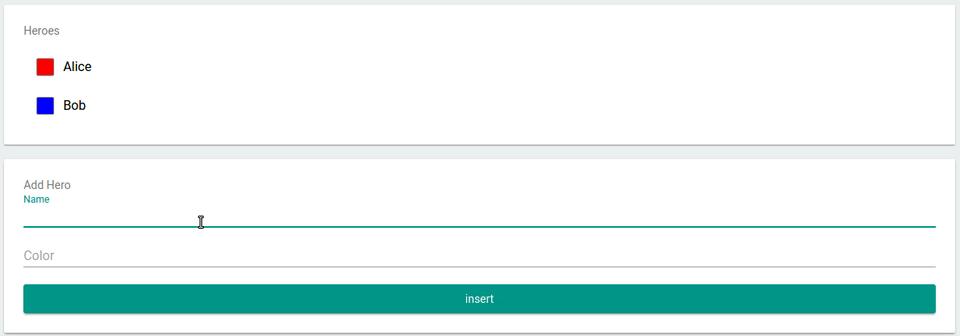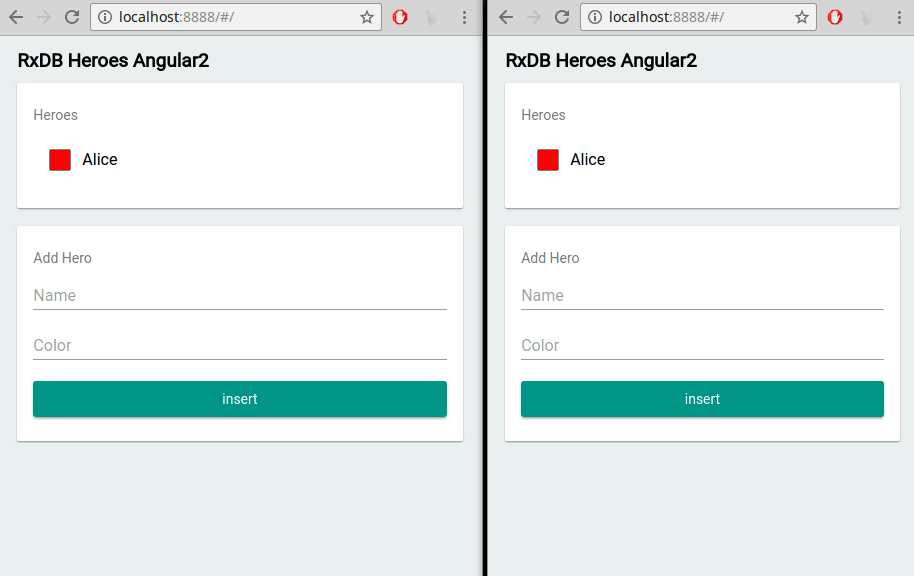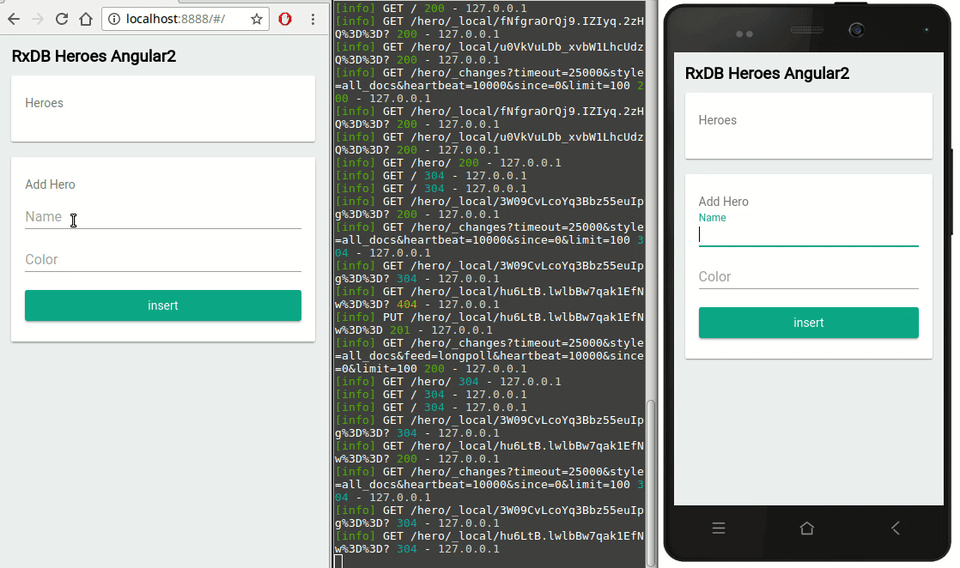Reactive, serverless, client-side, offline-first database in javascript.
Documentation | Code Examples | Live Demo
- Multiplatform support for browsers, nodejs, electron, cordova, react-native and every other javascript-runtime
- Reactive data-handling based on rxjs
- Replication between client and server-data, compatible with
 PouchDB,
PouchDB,  CouchDB and
CouchDB and  IBM Cloudant
IBM Cloudant - Schema-based with the easy-to-learn standard of jsonschema
- Mango-Query exactly like you know from mongoDB and mongoose
- Encryption of single data-fields to protect your users data
- Import/Export of the database-state (json), awesome for coding with TDD
- Multi-Window to synchronise data between different browser-windows or nodejs-processes
- ORM-capabilities to easily handle data-code-relations
RxDB is made so that you can use exactly the same code at
We optimized, double-checked and made boilerplates so you can directly start to use RxDB with frameworks like
npm install rxdb --save
# peerDependencies
npm install rxjs babel-polyfill --saveES7
import 'babel-polyfill'; // only needed when you dont have polyfills
import * as RxDB from 'rxdb';
const db = await RxDB.create({
name: 'heroesdb',
adapter: 'websql',
password: 'myLongAndStupidPassword', // optional
multiInstance: true // default: true
}); // create database
await db.collection({name: 'heroes', schema: mySchema}); // create collection
db.heroes.insert({ name: 'Bob' }); // insert documentES5
require('babel-polyfill'); // only needed when you dont have polyfills
var RxDB = require('rxdb');
RxDB.create({
name: 'heroesdb',
adapter: 'websql',
password: 'myLongAndStupidPassword', // optional
multiInstance: true // default: true
}) // create database
.then(function(db) {return db.collection({name: 'heroes', schema: mySchema});}) // create collection
.then(function(collection) {collection.insert({name: 'Bob'});}) // insert document
Mango-Query
To find data in your collection, use the mquery api to create chained mango-queries, which you maybe know from mongoDB or mongoose.
myCollection
.find()
.where('name').ne('Alice')
.where('age').gt(18).lt(67)
.limit(10)
.sort('-age')
.exec().then( docs => {
console.dir(docs);
});
Reactive
RxDB implements rxjs to make your data reactive.
This makes it easy to always show the real-time database-state in the dom without manually re-submitting your queries.
db.heroes
.find()
.sort('name')
.$ // <- returns observable of query
.subscribe( docs => {
myDomElement.innerHTML = docs
.map(doc => '<li>' + doc.name + '</li>')
.join();
});
MultiWindow/Tab
When two instances of RxDB use the same storage-engine, their state and action-stream will be broadcasted.
This means with two browser-windows the change of window #1 will automatically affect window #2. This works completely serverless.
Replication
Because RxDB relies on glorious PouchDB, it is easy to replicate
the data between devices and servers. And yes, the changeEvents are also synced.
Schema
Schemas are defined via jsonschema and are used to describe your data.
const mySchema = {
title: "hero schema",
version: 0, // <- incremental version-number
description: "describes a simple hero",
type: "object",
properties: {
name: {
type: "string",
primary: true // <- this means: unique, required, string and will be used as '_id'
},
secret: {
type: "string",
encrypted: true // <- this means that the value of this field is stored encrypted
},
skills: {
type: "array",
maxItems: 5,
uniqueItems: true,
item: {
type: "object",
properties: {
name: {
type: "string"
},
damage: {
type: "number"
}
}
}
}
},
required: ["color"]
};
Encryption
By setting a schema-field to encrypted: true, the value of this field will be stored in encryption-mode and can't be read without the password. Of course you can also encrypt nested objects. Example:
encrypted: true, the value of this field will be stored in encryption-mode and can't be read without the password. Of course you can also encrypt nested objects. Example:"secret": {
"type": "string",
"encrypted": true
}
Level-adapters
The underlaying pouchdb can use different adapters as storage engine. So you can use RxDB in different environments by just switching the adapter.
For example you can use websql in the browser, localstorage in mobile-browsers and a leveldown-adapter in nodejs.
// this requires the localstorage-adapter
RxDB.plugin(require('rxdb-adapter-localstorage'));
// this creates a database with the localstorage-adapter
const db = await RxDB.create('heroesDB', 'localstorage');Some adapters you can use:
Import / Export
RxDB lets you import and export the whole database or single collections into json-objects. This is helpful to trace bugs in your application or to move to a given state in your tests.
// export a single collection
const jsonCol = await myCollection.dump();
// export the whole database
const jsonDB = await myDatabase.dump();
// import the dump to the collection
await emptyCollection.importDump(json);
// import the dump to the database
await emptyDatabase.importDump(json);
Leader-Election
Imagine your website needs to get a piece of data from the server once every minute. To accomplish this task
you create a websocket or pull-interval. If your user now opens the site in 5 tabs parallel, it will run the interval
or create the socket 5 times. This is a waste of resources which can be solved by RxDB's LeaderElection.
myRxDatabase.waitForLeadership()
.then(() => {
// this will only run when the instance becomes leader.
mySocket = createWebSocket();
});In this example the leader is marked with the crown ♛
Key-Compression
Depending on which adapter and in which environment you use RxDB, client-side storage is limited in some way or the other. To save disc-space, RxDB has an internal schema-based key-compression to minimize the size of saved documents.
Example:
// when you save an object with big keys
await myCollection.insert({
firstName: 'foo'
lastName: 'bar'
stupidLongKey: 5
});
// RxDB will internally transform it to
{
'|a': 'foo'
'|b': 'bar'
'|c': 5
}
// so instead of 46 chars, the compressed-version has only 28
// the compression works internally, so you can of course still access values via the original key.names
console.log(myDoc.firstName);
// 'foo'
QueryChangeDetection
Similar to Meteors oplog-observe-driver,
RxDB has a QueryChangeDetection to optimize observed or reused queries. This makes sure that when you update/insert/remove documents,
the query does not have to re-run over the whole database but the new results will be calculated from the events. This creates a huge performance-gain
with zero cost. The QueryChangeDetection works internally and is currently in beta (disabled by default).
Imagine you have a very big collection with many user-documents. At your page you want to display a toplist with users which have the most points and are currently logged in.
You create a query and subscribe to it.
const query = usersCollection.find().where('loggedIn').eq(true).sort('points');
query.$.subscribe(users => {
document.querySelector('body').innerHTML = users
.reduce((prev, cur) => prev + cur.username+ '<br/>', '');
});As you may detect, the query can take very long time to run, because you have thousands of users in the collection. When a user now loggs of, the whole query will re-run over the database which takes again very long.
anyUser.loggedIn = false;
await anyUser.save();But not with the QueryChangeDetection enabled.
Now, when one user loggs of, it will calculate the new results from the current results plus the RxChangeEvent. This often can be done in-memory without making IO-requests to the storage-engine. The QueryChangeDetection not only works on subscribed queries, but also when you do multiple .exec()'s on the same query.
All major evergreen browsers and IE11 are supported. Tests automatically run against Firefox and Chrome, and manually in a VirtualBox for IE11 and Edge.
As RxDB heavily relies on PouchDB, see their browser support for more information. Also do keep in mind that different browsers have different storage limits, especially on mobile devices.
Get started now by reading the docs or exploring the example-projects.
You can test out RxDB in the browser with WebpackBin.
Check out how you can contribute to this project.
- Follow RxDB on twitter to not miss the latest enhancements.
- Join the chat on gitter for discussion.
- Support RxDB at patreon
A big Thank you to every patreon-supporter and every contributor of this project.











